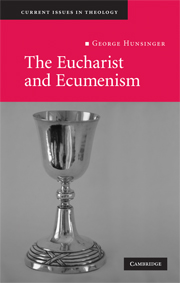Book contents
- Frontmatter
- Contents
- Acknowledgments
- Introduction: Ecumenical theology
- Part I Real presence
- Part II Eucharistic sacrifice
- Part III Eucharist and ministry
- Part IV Eucharist and social ethics
- 7 The eucharistic transformation of culture
- 8 Nicene Christianity, the eucharist, and peace
- Conclusion: Let us keep the feast
- Index
- References
7 - The eucharistic transformation of culture
Published online by Cambridge University Press: 05 June 2012
- Frontmatter
- Contents
- Acknowledgments
- Introduction: Ecumenical theology
- Part I Real presence
- Part II Eucharistic sacrifice
- Part III Eucharist and ministry
- Part IV Eucharist and social ethics
- 7 The eucharistic transformation of culture
- 8 Nicene Christianity, the eucharist, and peace
- Conclusion: Let us keep the feast
- Index
- References
Summary
The purpose of this chapter is to reconsider H. Richard Niebuhr's book Christ and Culture by developing its implications for the eucharist. More precisely, the intention is more the reverse, namely, to ask how the eucharist might bear on Niebuhr's question of Christ and culture. Although the eucharist was far from his mind, elements of Niebuhr's thought can be moved in this direction. A eucharistic relocation of the idea of Christ transforming culture promises not only to disclose weaknesses in Niebuhr's reasoning, but also to secure some of its strengths. Beyond Niebuhr, the goal is to sketch a eucharistic understanding of social ethics grounded in the meaning of the sacrament itself.
Reconsidering Christ and Culture
Ever since being proposed in the mid-twentieth century, H. Richard Niebuhr's idea of Christ transforming culture has enjoyed a remarkably favorable reception. Not surprisingly so, for it held out at least three advantages.
First, it moved beyond a narrowly individualistic notion of conversion. The prospect of transforming culture appealed to many who felt that there was more to the relevance of the gospel than simply converting the individual soul. Cultures, not just individuals, were in need of reform and renewal.
Second, it broke with Protestant individualism more broadly. The human self, on Niebuhr's view, was always a social self, not a solitary self. Individuals never existed apart from a complex network of social and cultural conditions by which they were shaped. The integrity of the gospel depended on seeing persons as persons in relation.
- Type
- Chapter
- Information
- The Eucharist and EcumenismLet Us Keep the Feast, pp. 247 - 278Publisher: Cambridge University PressPrint publication year: 2008



